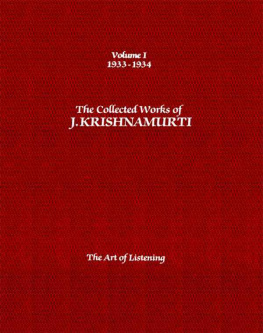Krishnamurti - The Collected Works of J. Krishnamurti, Volume 01 (1933-1934): The Art of Listening
Here you can read online Krishnamurti - The Collected Works of J. Krishnamurti, Volume 01 (1933-1934): The Art of Listening full text of the book (entire story) in english for free. Download pdf and epub, get meaning, cover and reviews about this ebook. genre: Religion. Description of the work, (preface) as well as reviews are available. Best literature library LitArk.com created for fans of good reading and offers a wide selection of genres:
Romance novel
Science fiction
Adventure
Detective
Science
History
Home and family
Prose
Art
Politics
Computer
Non-fiction
Religion
Business
Children
Humor
Choose a favorite category and find really read worthwhile books. Enjoy immersion in the world of imagination, feel the emotions of the characters or learn something new for yourself, make an fascinating discovery.
- Book:The Collected Works of J. Krishnamurti, Volume 01 (1933-1934): The Art of Listening
- Author:
- Genre:
- Rating:5 / 5
- Favourites:Add to favourites
- Your mark:
- 100
- 1
- 2
- 3
- 4
- 5
The Collected Works of J. Krishnamurti, Volume 01 (1933-1934): The Art of Listening: summary, description and annotation
We offer to read an annotation, description, summary or preface (depends on what the author of the book "The Collected Works of J. Krishnamurti, Volume 01 (1933-1934): The Art of Listening" wrote himself). If you haven't found the necessary information about the book — write in the comments, we will try to find it.
The Collected Works of J. Krishnamurti, Volume 01 (1933-1934): The Art of Listening — read online for free the complete book (whole text) full work
Below is the text of the book, divided by pages. System saving the place of the last page read, allows you to conveniently read the book "The Collected Works of J. Krishnamurti, Volume 01 (1933-1934): The Art of Listening" online for free, without having to search again every time where you left off. Put a bookmark, and you can go to the page where you finished reading at any time.
Font size:
Interval:
Bookmark:


COLLECTED WORKS VOLUME 1
Photo: J. Krishnamurti, ca 1935 by Edwin Gledhill
Copyright 2012 by Krishnamurti Foundation America
P.O Box 1560, Ojai, CA 93024
Website: www.kfa.org
All rights reserved. No part of this publication may be reproduced, stored in a retrieval system, or transmitted, in any form or by any means, electronic, mechanical, photocopying, recording, or otherwise, without the prior written permission of the copyright owner.
Printed in the United States of America
ISBN 13: 9781934989340
ISBN: 1934989347
eBook ISBN: 978-1-62112-677-5
Contents
Jiddu Krishnamurti was born in 1895 of Brahmin parents in south India. At the age of fourteen he was proclaimed the coming World Teacher by Annie Besant, then president of the Theosophical Society, an international organization that emphasized the unity of world religions. Mrs. Besant adopted the boy and took him to England, where he was educated and prepared for his coming role. In 1911 a new worldwide organization was formed with Krishnamurti as its head, solely to prepare its members for his advent as World Teacher. In 1929, after many years of questioning himself and the destiny imposed upon him, Krishnamurti disbanded this organization, saying:
Truth is a pathless land, and you cannot approach it by any path whatsoever, by any religion, by any sect. Truth, being limitless, unconditioned, unapproachable by any path whatsoever, cannot be organized; nor should any organization be formed to lead or to coerce people along any particular path. My only concern is to set men absolutely, unconditionally free.
Until the end of his life at the age of ninety, Krishnamurti traveled the world speaking as a private person. The rejection of all spiritual and psychological authority, including his own, is a fundamental theme. A major concern is the social structure and how it conditions the individual. The emphasis in his talks and writings is on the psychological barriers that prevent clarity of perception. In the mirror of relationship, each of us can come to understand the content of his own consciousness, which is common to all humanity. We can do this, not analytically, but directly in a manner Krishnamurti describes at length. In observing this content we discover within ourselves the division of the observer and what is observed. He points out that this division, which prevents direct perception, is the root of human conflict.
His central vision did not waver after 1929, but Krishnamurti strove for the rest of his life to make his language even more simple and clear. There is a development in his exposition. From year to year he used new terms and new approaches to his subject, with different nuances.
Because his subject is all-embracing, the Collected Works are of compelling interest. Within his talks in any one year, Krishnamurti was not able to cover the whole range of his vision, but broad amplifications of particular themes are found throughout these volumes. In them he lays the foundations of many of the concepts he used in later years.
The Collected Works contain Krishnamurtis previously published talks, discussions, answers to specific questions, and writings for the years 1933 through 1967. They are an authentic record of his teachings, taken from transcripts of verbatim shorthand reports and tape recordings.
The Krishnamurti Foundation of America, a California charitable trust, has among its purposes the publication and distribution of Krishnamurti books, videocassettes, films and tape recordings. The production of the Collected Works is one of these activities.

Friends,
I should like you to make a living discovery, not a discovery induced by the description of others. If someone, for instance, had told you about the scenery here, you would come with your minds prepared by that description, and then perhaps you would be disappointed by the reality. No one can describe reality. You must experience it, see it, feel the whole atmosphere of it. When you see its beauty and loveliness, you experience a renewing, a quickening of joy.
Most people who think that they are seeking truth have already prepared their minds for its reception by studying descriptions of what they are seeking. When you examine religions and philosophies, you find that they have all tried to describe reality; they have tried to describe truth for your guidance. Now, I am not going to try to describe what to me is truth, for that would be an impossible attempt. One cannot describe or give to another the fullness of an experience. Each one must live it for himself.
Like most people, you have read, listened and imitated; you have tried to find out what others have said concerning truth and God, concerning life and immortality. So you have a picture in your mind, and now you want to compare that picture with what I am going to say. That is, your mind is seeking merely description; you do not try to find out anew, but only try to compare. But since I shall not try to describe truth, for it cannot be described, naturally there will be confusion in your mind.
When you hold before yourself a picture that you are trying to copy, an ideal that you are trying to follow, you can never face an experience fully; you are never frank, never truthful as regards yourself and your own actions; you are always protecting yourself with an ideal. If you really probe into your own mind and heart, you will discover that you come here to get something new: a new idea, a new sensation, a new explanation of life, in order that you may mold your own life according to that. Therefore, you are really searching for a satisfactory explanation. You have not come with an attitude of freshness, so that by your own perception, your own intensity, you may discover the joy of natural and spontaneous action. Most of you are merely seeking a descriptive explanation of truth, thinking that if you can find out what truth is, you can then mold your lives according to that eternal light.
If that be the motive of your search, then it is not a search for truth. It is rather for consolation, for comfort; it is but an attempt to escape the innumerable conflicts and struggles that you must face every day.
Out of suffering is born the urge to seek truth; in suffering lies the cause of the insistent inquiry, the search for truth. Yet when you sufferas everyone does sufferyou seek an immediate remedy and comfort. When you feel momentary physical pain, you obtain a palliative at the nearest drugstore to lessen your suffering. So also, when you experience momentary mental or emotional anguish, you seek consolation, and you imagine that trying to find relief from pain is the search for truth. In that way you are continually seeking a compensation for your pains, a compensation for the effort you are thus forced to make. You evade the main cause of suffering and thereby live an illusory life.
So those people who are always proclaiming that they are searching for truth are in reality missing it. They have found their lives to be insufficient, incomplete, lacking in love, and think that by trying to seek truth they will find satisfaction and comfort. If you frankly say to yourself that you are seeking only consolation and compensation for the difficulties of life, you will be able to grapple with the problem intelligently. But as long as you pretend to yourself that you are seeking something more than mere compensation, you cannot see the matter clearly. The first thing to find out, then, is whether you are really seeking, fundamentally seeking truth.
Font size:
Interval:
Bookmark:
Similar books «The Collected Works of J. Krishnamurti, Volume 01 (1933-1934): The Art of Listening»
Look at similar books to The Collected Works of J. Krishnamurti, Volume 01 (1933-1934): The Art of Listening. We have selected literature similar in name and meaning in the hope of providing readers with more options to find new, interesting, not yet read works.
Discussion, reviews of the book The Collected Works of J. Krishnamurti, Volume 01 (1933-1934): The Art of Listening and just readers' own opinions. Leave your comments, write what you think about the work, its meaning or the main characters. Specify what exactly you liked and what you didn't like, and why you think so.










